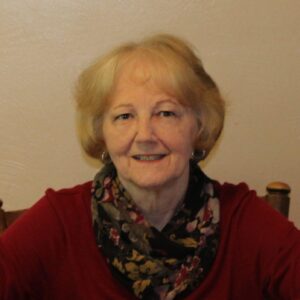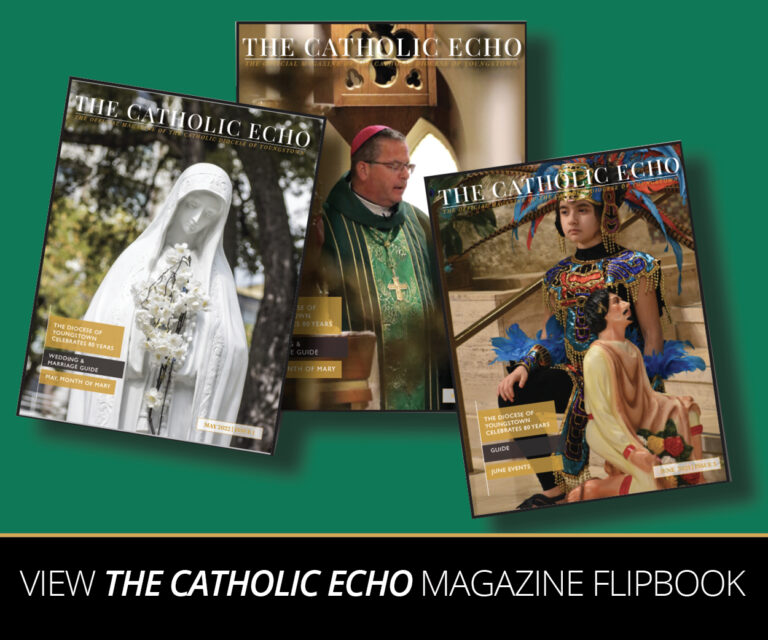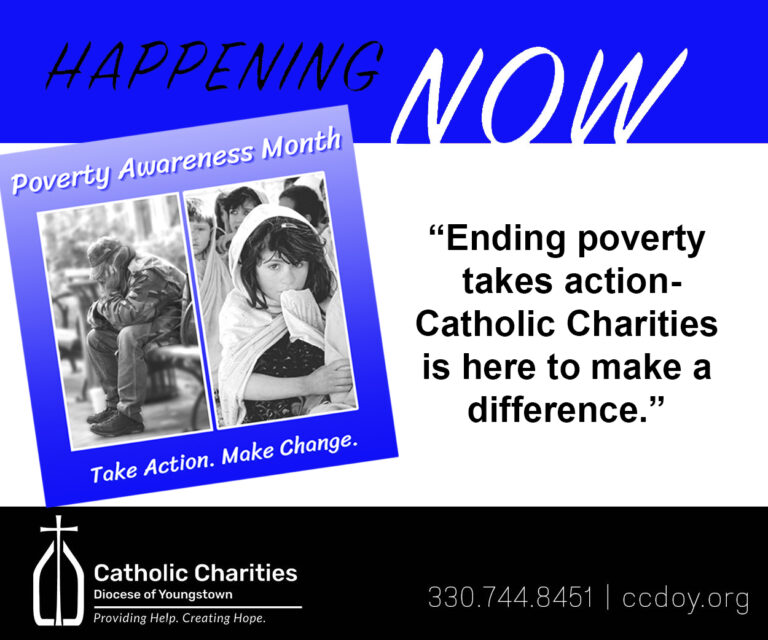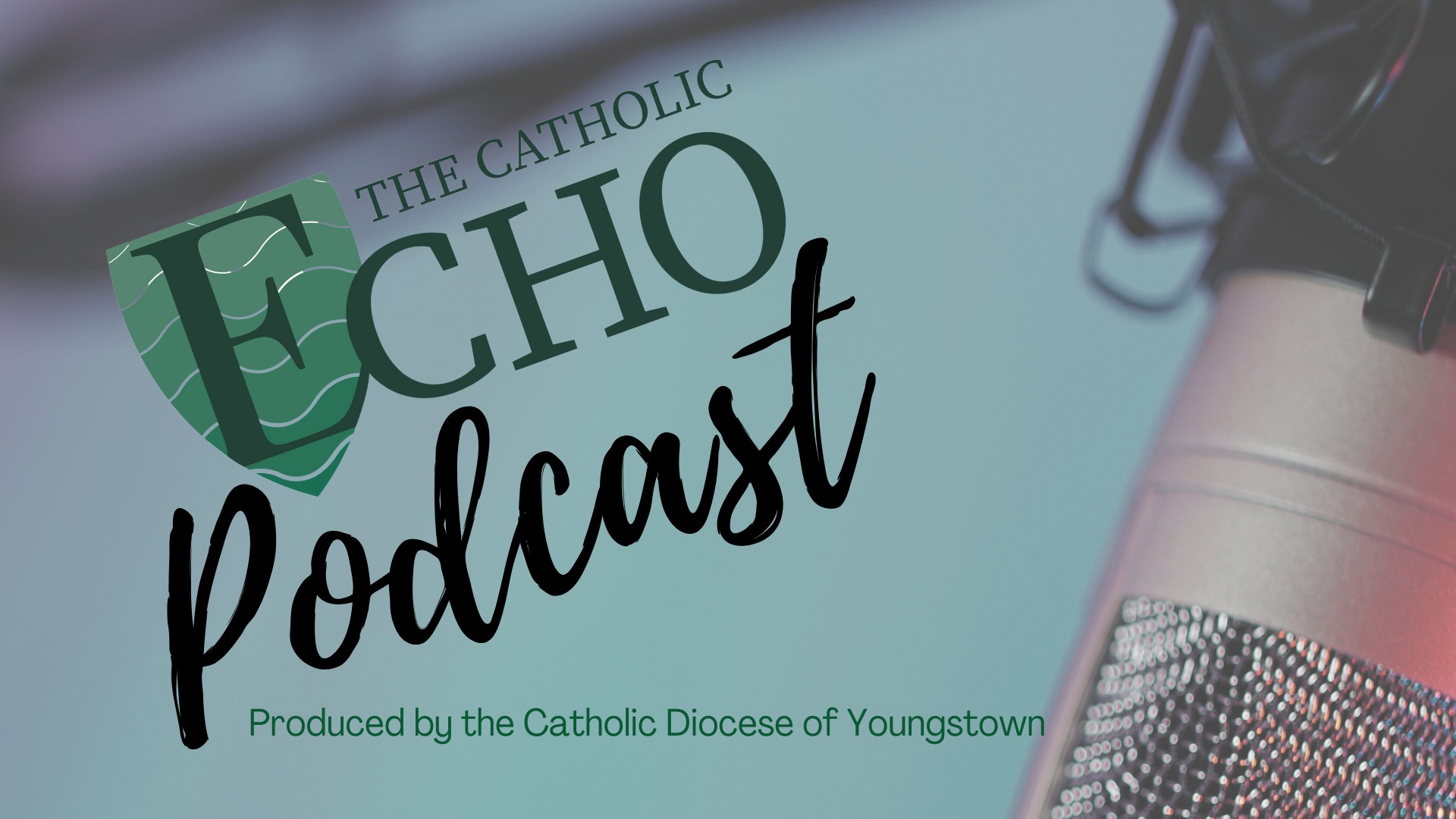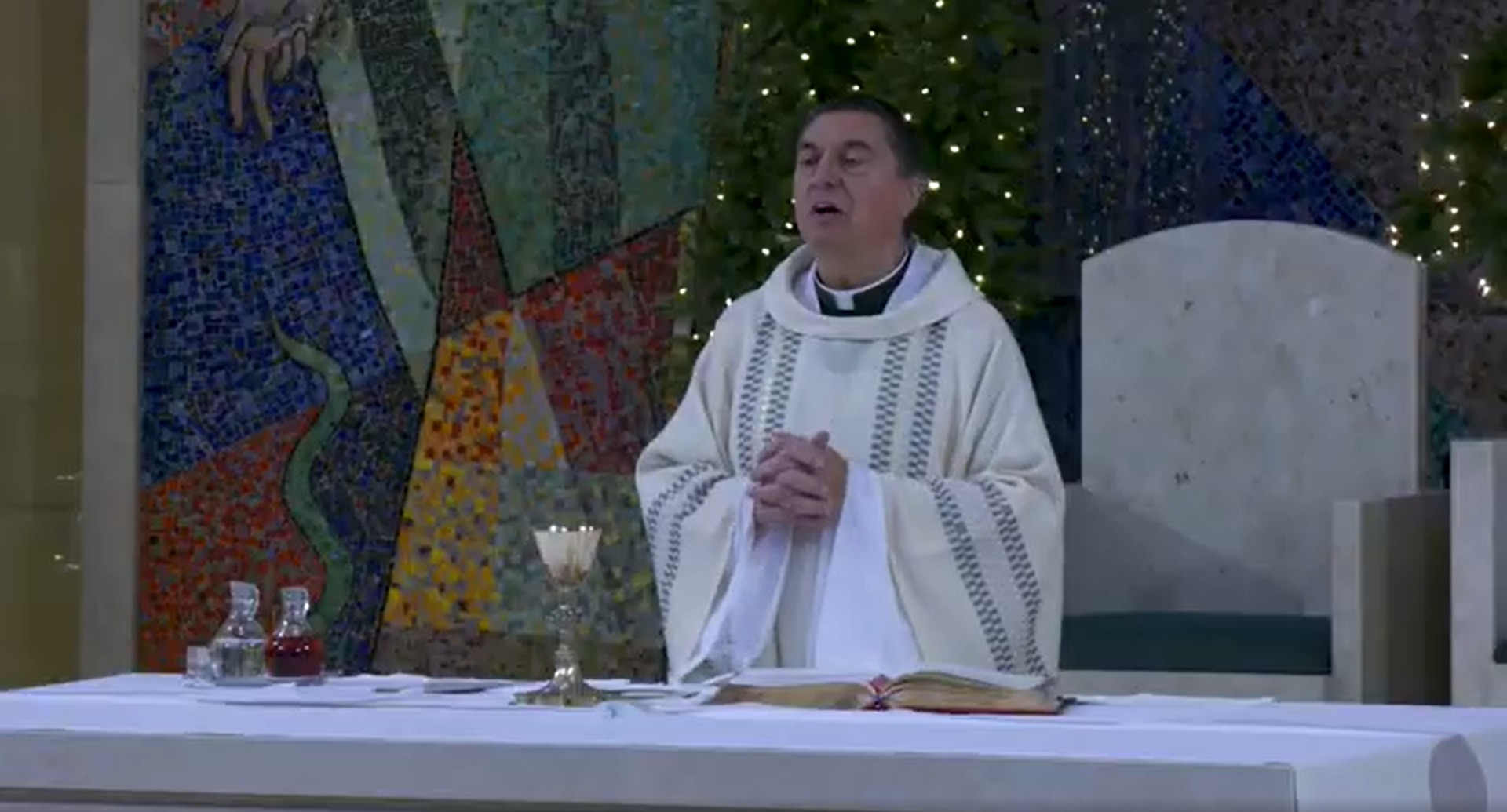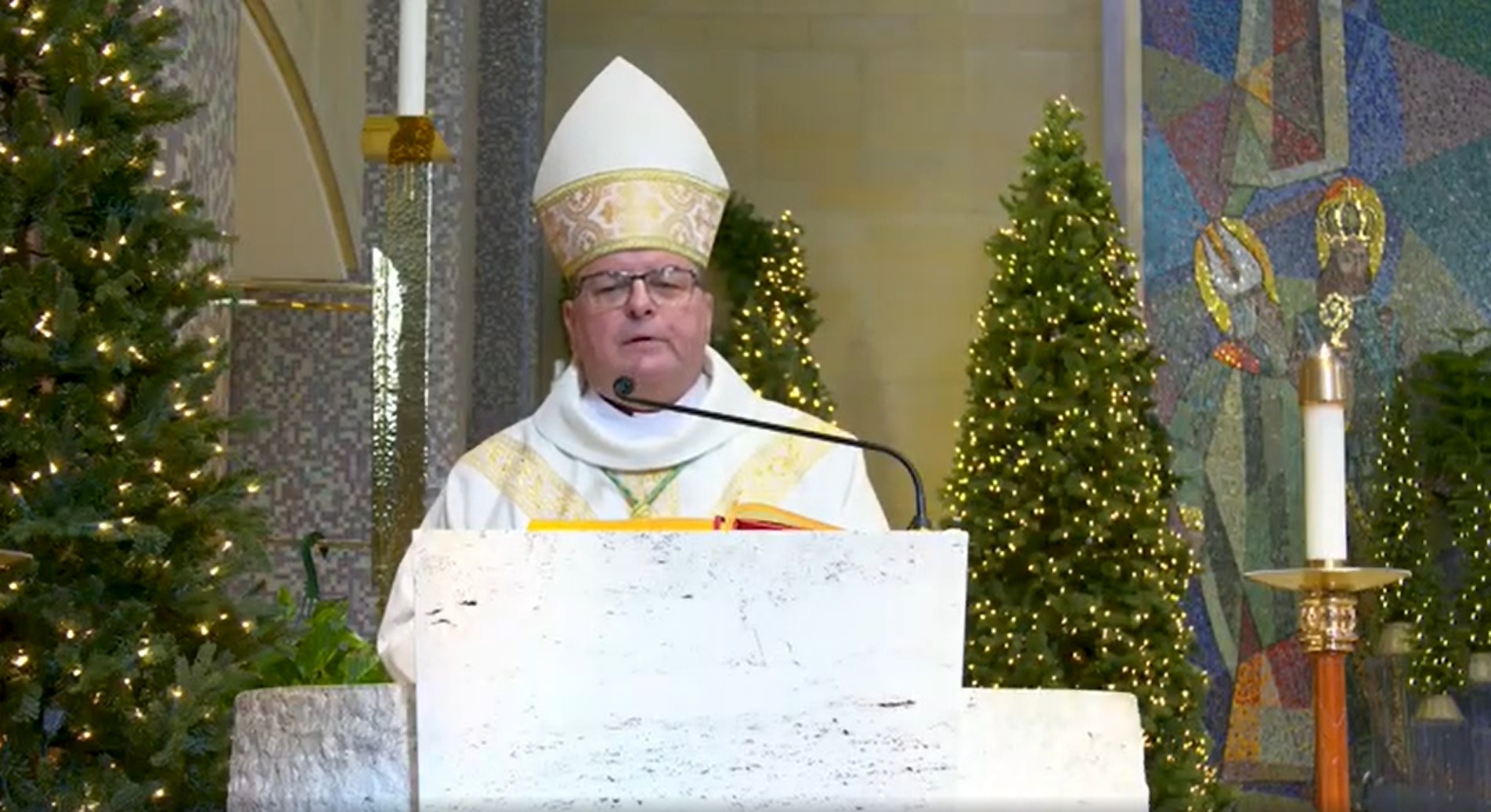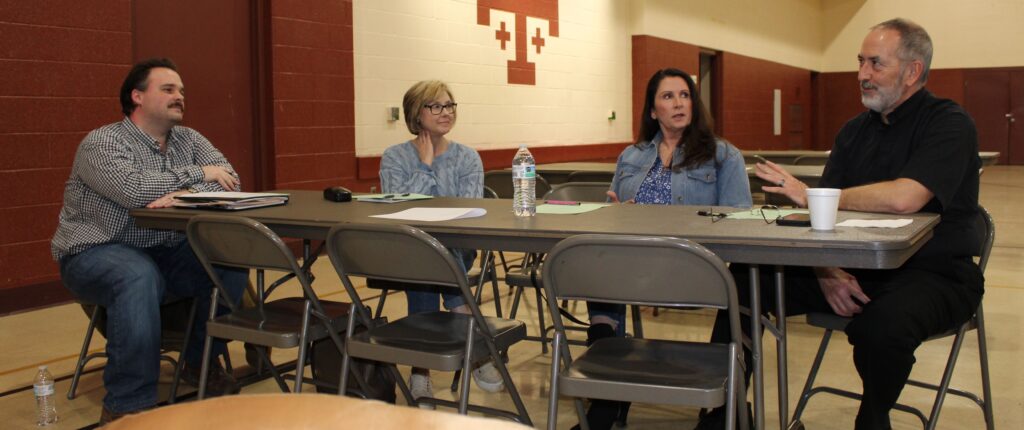
Outreach to the poor, the sick and the marginalized. The role of parish communities in upholding traditions and being small vessels to preserve culture and the essence of the faith. These were recognized as strengths of the Diocese of Youngstown.
At the same time, people in general leaving the Catholic faith and young people who have given up being Catholic were listed as distresses.
These responses and more emanated from a listening session regarding the Worldwide Synod which Bishop David Bonnar invited diocesan Catholics to attend.
Representatives from parishes throughout the Mahoning and Columbiana deaneries met at St. Charles Parish in Boardman on Monday, March 4 for the first of several listening sessions to be held this month.
Monsignor Zuraw, diocesan Vicar General, welcomed attendees to St. Charles Parish (Bishop Bonnar was unable to attend the first listening session due to a previous commitment). The evening began with a prayer to the Holy Spirit, asking for guidance in the listening process.
Noting the Church is in the midst of the Synod on Synodality, Monsignor Zuraw stated “during the last two years, the diocese has been involved in answering a series of ten questions” as part of the Synod process. The responses accumulated through various listening sessions throughout the diocese were assembled into a ten-page document that was sent to the United States Conference of Catholic Bishops (USCCB).
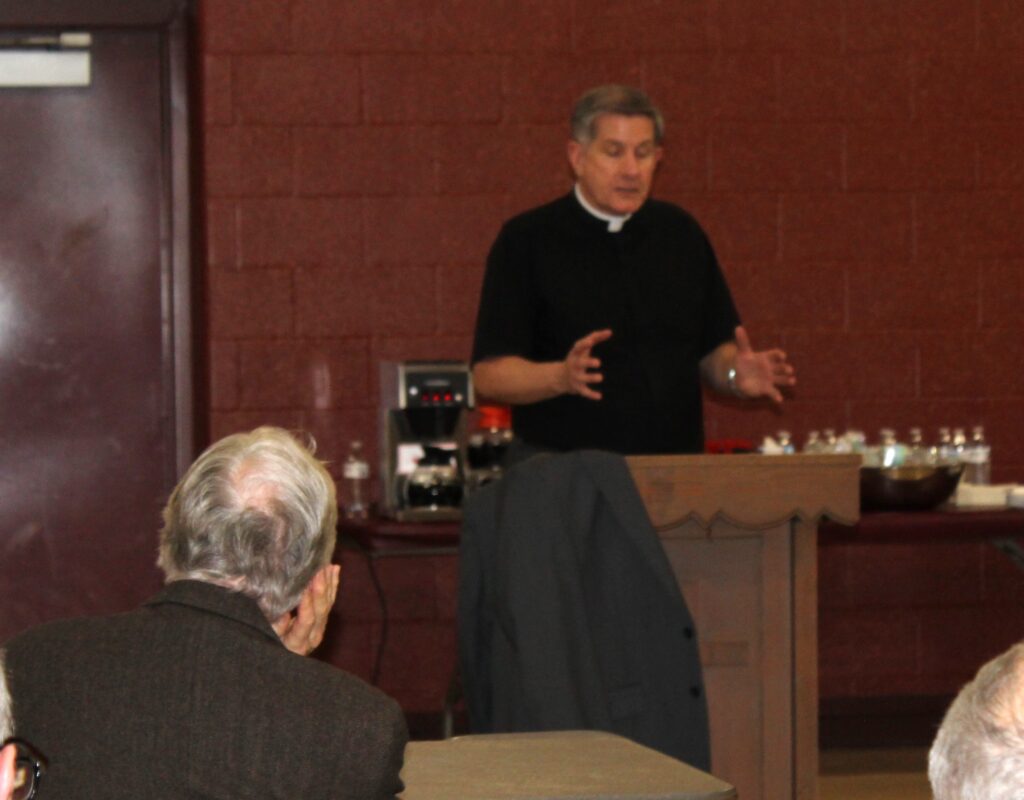
“The USCCB compiled the American documents into one and that was part of the discussions at the Vatican this past October. From October, the Synod members came up with two additional questions that they would like input on. Those two questions are the basis for these listening sessions,” Monsignor Zuraw explained.
After completion of the listening sessions, he continued, the Youngstown Diocese will compile the current responses into a five-page document that will be sent to the USCCB and to every diocesan parish. The national bishop’s conference will then develop one document that represents the United States.
Following the explanation of the process, attendees divided into small groups. Each group was asked to summarize their thoughts on each of two questions and report their responses to the entire group.
The two questions being considered at each listening session are:
- Where have I seen or experienced successes and distresses within the Church’s structure(s)/organizations/ leadership/life that encourages or hinders the mission?
- How can the structure and organization of the Church help all the baptized to respond to the call to proclaim the Gospel and to live as a community of love and mercy in Christ?
In response to question one, Linda McClure, a member of St. Luke Parish in Boardman, said her group felt successes occurred “if there is a strong involvement of laity and inclusion of women and young people, there is a sense of spirituality outside of Sunday worship and there is a development of social justice, especially with marginalized groups”.
Dominic Donofrio, a member of Our Lady of the Holy Rosary Parish in Lowellville, said his group also cited the ministerial approach globally of serving the poor and the sick, raising them up as Christ did, as successes within the Church. “Another strong point was the parish communities upholding traditions, ethnic and otherwise, in local communities; and advocating for additional people to help at all levels,” Donofrio commented.
Other successes expressed were the longevity and creativity of local Church leaders, generational involvement in parishes, and outreach efforts to the community.
St. Dominic Parish in Youngstown highlighted the growing Hispanic membership in their parish as a success.
Turning to distresses, McClure’s group noted the lack of focus on the Pope Francis’ pastoral approach, a lack of trust in Church leaders and a wavering in some faith communities. “There’s also stress with shortage of clergy and closing of parishes. Because of that, some people are confused or feel they’re being ignored,” McClure’s group reported.
Michael Jordan, a member of St. Patrick Parish in Youngstown said his group cited lack of youth involvement, and minimal emphasis on encouraging vocations. “We have great ministries, but we have a problem of finding people to buy into and man those programs. A lot of that has to do with aging parishioners,” his group concluded.
Donofrio’s group saw the clergy shortage as a need to task more laity with advancing the Church’s mission. “When 70 percent of Catholics don’t recognize the Eucharist as the body, blood, soul and divinity of God from which everything flows, there is a worship problem, a catechesis problem. We need to work on that with consistency and teaching in liturgical practices and catechesis. We also want to ensure consistencies from parish to parish,” the participants stated.
Father Joseph Ruggieri, a retired diocesan priest, noted the change in leadership at diocesan offices from qualified lay people to increasingly overburdened priests. “Finding, training and retaining qualified lay people is a challenge,” Father Ruggieri acknowledged, adding that a focus there would allow priests more time for other ministries.
St. Dominic Parish said because of the shortage of priests, the average Catholic doesn’t have a lot of interaction with priests. This can contribute to a lack of involvement and willingness to get involved in parish life, they believe.
Moving to the second question on proclaiming the Gospel and living as a community of love and mercy, McClure’s group suggested “a better use of social media with an emphasis on evangelization and encouraging people to share Jesus in their encounters with other people.” The group added, “clergy need to convey a sense of joy in their jobs. Some don’t project a sense of joy that they’re worshipping their God.”
The St. Dominic Parish group, encouraged a support structure within the Church. “The biggest thing is to make Christ visible through all of us by listening and forming small groups of people to talk about Christ, the Bible,” they commented.
Father Vincent DeLucia, OP, prior/pastor of St. Dominic Parish, said, “It takes a lot of time, patience, faith, and willingness to be open to form and sustain these groups. I’ve seen small groups that have stayed together for many years. They become a family of faith.”
Jordan’s group highlighted a need for “outreach to new people and young people, more effective use of social media, texting versus phone calls to better reach some people and an increase in social activities.”
Donofrio’s group cited a need for effective leadership to help spread the Gospel, adding more laity to help in that mission, having uniformity and having a consistent evangelizing message.
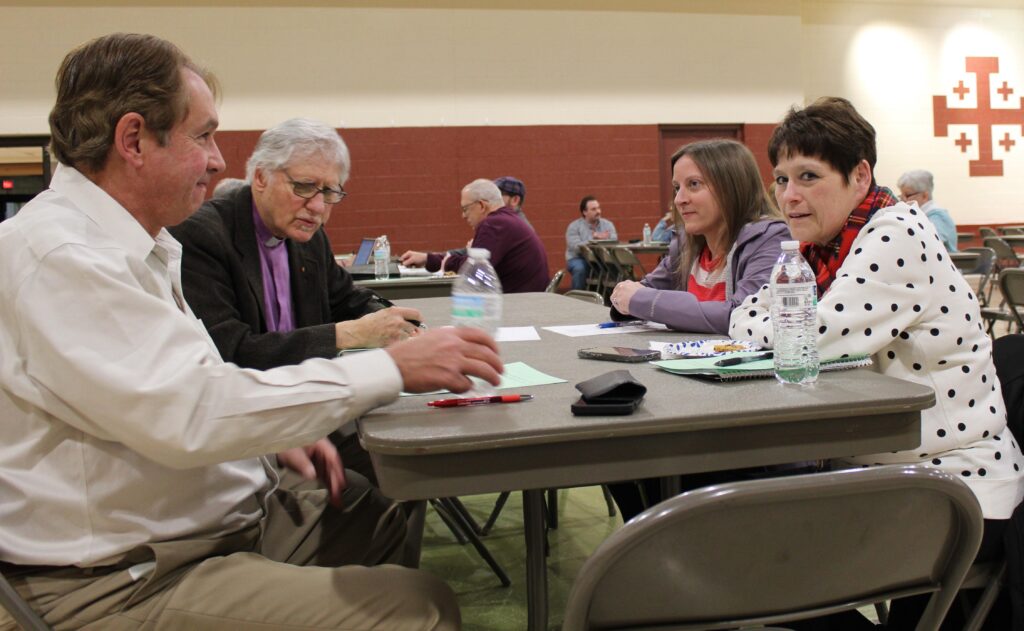
Other group responses included teaching the faith through the catechism and daily Scripture, an increase in adult formation programs, Bible studies, helping all people recognize the Holy Spirit and inviting people to attend Mass and prayer groups.
“Also, helping with anything that supports families because the family is the best medium to transfer the faith from generation to generation. That’s how we will win souls,” Donofrio remarked.
Attendees were then asked if there was anything else that should be included in this document to express who the Church of Youngstown is to the wider Church.
“In the wider culture, sports is a priority for a lot of people. How do we bring that kind of issue and other things in our culture that are anathema to the Gospel message? Young people want [help with these issues] from the Church. They want a Church that is centered on what is going on in their daily life and they don’t always get that,” said Eileen Novotony, a member of St. Angela Merici Parish in Youngstown.
Also mentioned was the effect priests having multiple assignments has on young men’s consideration of a priestly vocation [as too difficult]. An additional consensus agreed that enabling young Catholics to see themselves in a position of future leadership in the Church is lacking with the current Church.
Thoughts in regard to changing this view included: changing perceptions needs to start with men being disciples again, being leaders in their household, having fraternities within the diocese and making Sunday Mass and prayer a family priority.
“When the family makes their kids’ soccer games, their god on Sundays they’re worshipping false gods,” noted McClure. “It’s hard for us as parents because we took our kids to Mass every Sunday and talked about God in our homes and now these adult children don’t believe Church is that important,” she added.
“We as a Church are far less effective than we used to be. Parents are pushing their kids to be the next superstar athlete. What has made us less effective and how can we get that back?” asked Ray Novotony, a member of St. Angela Merici and St. Michael parishes.
One answer proposed was communication, reaching out as a Church to these organizations and asking for games and practices to be moved back three or four hours so families can attend Mass.
“It’s a great ecumenical effort that we can join forces with every other religious denomination in the diocese because they’re all facing the same issue. We need to be a voice in the community and say we want our kids in church on Sunday mornings. That’s a great starting point,” said Father Ruggieri.
Monsignor Zuraw concluded the session by thanking everyone for their attendance and input.
The Synod on Synodality began a two-year process of listening and dialogue in October 2021 with solemn opening liturgies in Rome and in dioceses around the world. The diocesan phase of listening spanned from Fall 2021 through Spring 2022 and concluded in October 2023 with the discussion on documents presented to the Vatican.
The word “Synod” comes from a Greek word which means, “to be on the journey together.” Following an ancient model, the contemporary Synod of Bishops was established as an institution after the Second Vatican Council (1962-1965), to advise the Pope on important aspects of Church life and mission. Recent synods have included consultations on evangelization (2012), family life (2015) and young people (2018).
Throughout his papacy, Pope Francis has emphasized that synodality involves the whole Church. The theme for the 2021-2023 synodal initiative is synodality itself, with the theme: “For a Synodal Church: Communion, Participation, and Mission.” All are encouraged to be part of this process.
